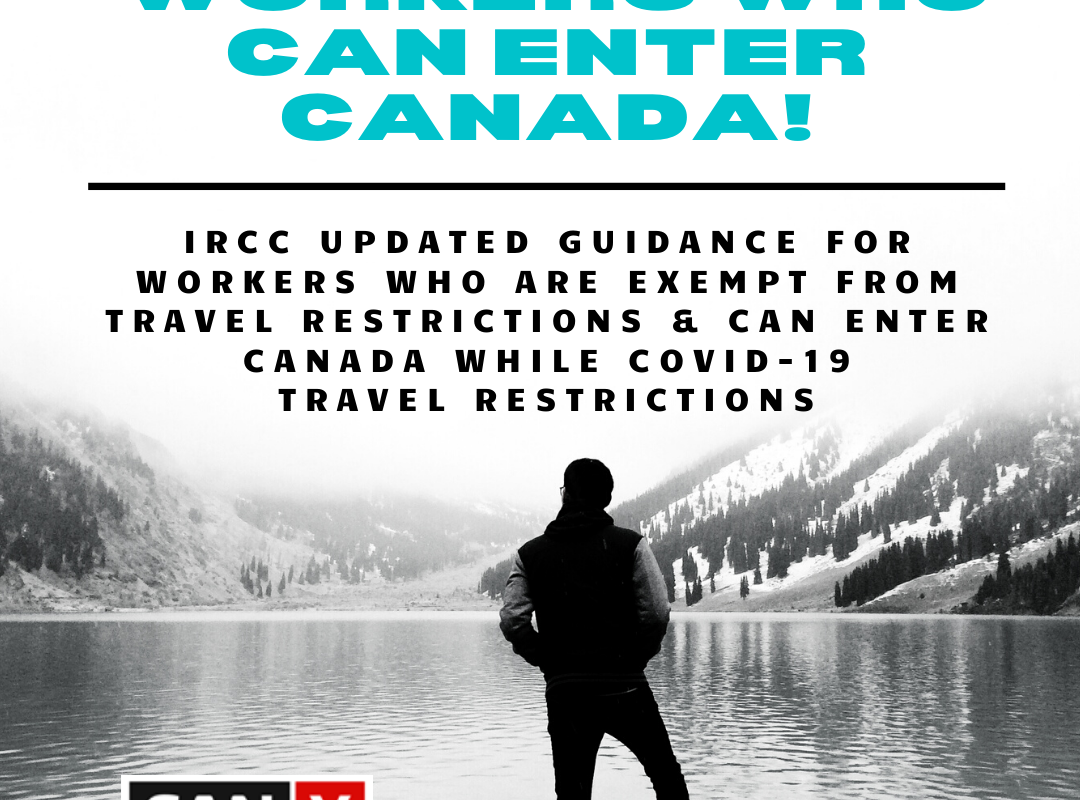IRCC has provided updated guidance for temporary workers who are exempt from travel restrictions and can enter Canada while COVID-19 travel restrictions remain in place. Work permit holders are among those exempt from the travel restrictions if their trip to Canada is for essential reasons. Immigration, Refugees and Citizenship Canada (IRCC) released the current guidance to provide more clarity to its staff and work permit holders about what constitutes essential travel.
Temporary workers who are exempt from travel restrictions
The foreign nationals who are currently outside Canada are not subject to Canada’s travel restrictions if travelling to Canada for a non-optional or non-discretionary purpose:
- Foreign nationals who hold a valid Canadian work permit (including an open work permit)
- Foreign nationals who has a positive decision from IRCC (documented by a letter of introduction) on a work permit application but whose work permit has not yet been issued
Work-permit exempt foreign nationals seeking to work in critical occupations are prioritized
IRCC will continue to prioritize the processing of work permit exemption applications overseas and in Canada to work in health, safety, and food security reasons. These foreign nationals are not subject to travel restrictions and may not be subject to the mandatory 14 – day quarantine period currently in place for most people entering Canada. Critical occupations include:
- providers of emergency services for the protection or preservation of life or property (e.g. firefighters and medical service providers)
- Foreign nationals who qualify for an LMIA – exempt work permit and their work are related to the protection or preservation of life or property related to the COVID-19 response and maintenance of critical infrastructure or services
- persons permitted to work as a student in a health field including as a medical elective or clinical clerk at a medical teaching institution in Canada, for the primary purpose of acquiring training, if they have written approval from the body that regulates that field
- workers in the marine transportation sector who are essential for the movement of goods by vessel
- persons who seek to enter Canada for the purpose of delivering, maintaining, or repairing medically necessary equipment or devices
- persons who seek to enter Canada for the purpose of making medical deliveries of cells, blood and blood products, tissues, organs or other body parts that are required for patient care in Canada during or within a reasonable period of time after the expiry of the Order
Non-optional or non-discretionary travel scenarios (worker can come to Canada)
- A foreign national has a valid work permit and ordinarily resides in Canada. Even if the person does not currently have a job in Canada, they can still enter the country since Canada is currently their primary residence.
- A foreign national has a letter of introduction for an open work permit, has a valid job offer, and will be able to work once they enter Canada.
- A foreign national has a letter of introduction for an employer-specific work permit, with a valid job offer, which they will be able to pursue upon entering Canada.
Optional travel scenarios (worker can not come to Canada)
- A foreign national has a letter of introduction for an employer-specific work permit, but the business of their prospective employer is closed due to the COVID-19 outbreak.
- A foreign national has a letter of introduction for an open work permit, has not secured a job contract and is simply planning to search for work opportunities in Canada.
Context-specific scenario
Officers will make discretionary decisions based on foreign national’s situation. Factors like foreign national’s current ties to Canada, whether they will be working in an essential occupation, and other motivations for travel to Canada such as whether an individual will be arriving to care for their children will be considered by the officer. For example, the spouse of the essential worker may be required to move to Canada to care for their children, given that schools are closed.
The Orders also exempt foreign nationals whose travel to Canada is authorized in writing by an officer or by a Global Affairs Canada (GAC) consular officer for the purpose of reuniting immediate family members (for example, a temporary worker is in Canada but their spouse and children went home to visit family and now cannot come back).
International Experience Canada (IEC) work permit applicants who received a letter of introduction and are outside Canada
IEC candidates who received a letter of introduction and have an offer of employment with an employer who is still operating during the COVID-19 outbreak may enter Canada. This applies to all IEC work permit holders under the three IEC categories (Working Holiday, Young Professionals, and International Co-op).
IRCC is still accepting and processing new work permit applications. Applicants outside of Canada can submit new work permit applications online. IRCC advises foreign nationals to ensure that their employer is currently allowed to operate based on the rules set out by the provincial or federal government that presides over the employer’s location. Applicants can also continue to submit applications to extend or to change conditions on their work permits from within Canada. Certain in-Canada applicants may still apply using paper applications if they meet one of the exemptions from the mandatory e-application requirement.
Need help staying in Canada!
The COVID-19 pandemic has led to challenging times in Canada and around the world. Many people are under distress and anxiety. We understand! Can-X is here to help you figure it out, so you can have peace of mind. You could be an international student, worker, or visitor looking to extend your stay in Canada. You may be seeking a pathway to permanent immigration. Or you may be looking to reunite with a loved one. Whatever the reason, contact us to discuss your immigration needs, and we’ll provide our insights and help as much as we can during these difficult times.
We Care!



